- Home
- About The School
- News
- People
- Courses
- Current Students
- Research
- Outreach and Public Engagement
- Green and Sustainable Chemistry
Facilities and Services
Summary of Facilities & Services
Facilities & Services
In accord with its focus on research, the School of Chemistry possesses a wide range of modern, research grade instrumentation. Researchers, whether post-doctoral fellows, postgraduate students, or 4th year undergraduate students, have good access to these instruments. Most of these facilities are also available to researchers from the wider university community, and some services are available to companies and other organisations.
General Services
Electronics and Mechanical Workshop
An electronics and mechanical workshop is available for building, repairing, or machining scientific equipment and components. The service is provided by Johnny Ryan, Tony Hogan, and Mick O'Shea.
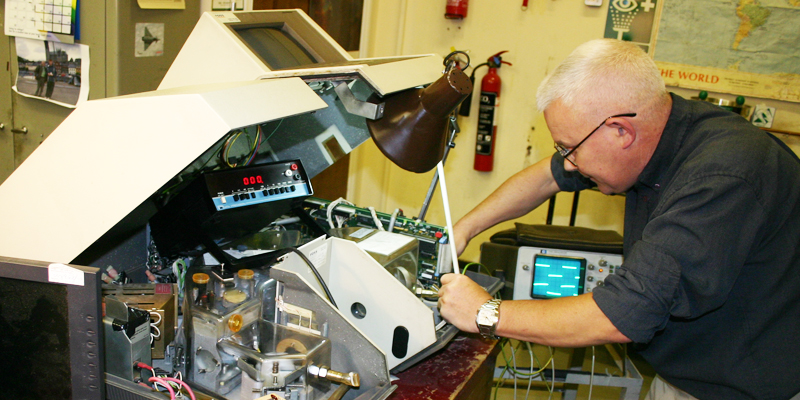
Liquid Nitrogen
Liquid nitrogen is supplied at a very competitive price within the university and to local customers (currently €2.00 per litre). Dewars with wheels must be supplied. Please order liquid nitrogen at least 24 hours in advance. Users must familiarise themselves with the safe handling procedures of Liquid Nitrogen before using the service.
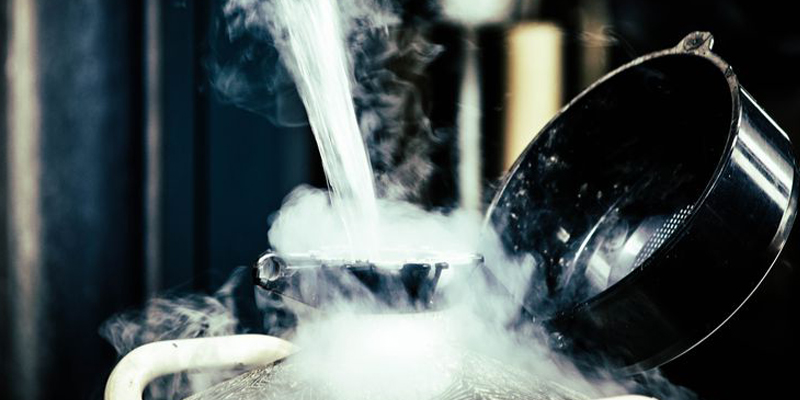
Disclaimer: The School of Chemistry, UCC, accepts no responsibility for the transport or use of supplies of liquid nitrogen provided by the School of Chemistry Liquid Nitrogen Service to external users.
Microanalytical Services
The Microanalytical Laboratory in the School of Chemistry offers a rapid, accurate and reliable contract analysis service to the School, other UCC schools and undertakes work from outside to other academic institutions and industries. The elements analysed are primarily carbon, hydrogen and nitrogen. We work within tolerance limits of ±0.30%, and results are carried out in duplicate unless otherwise instructed.
CE440 Elemental Analyser
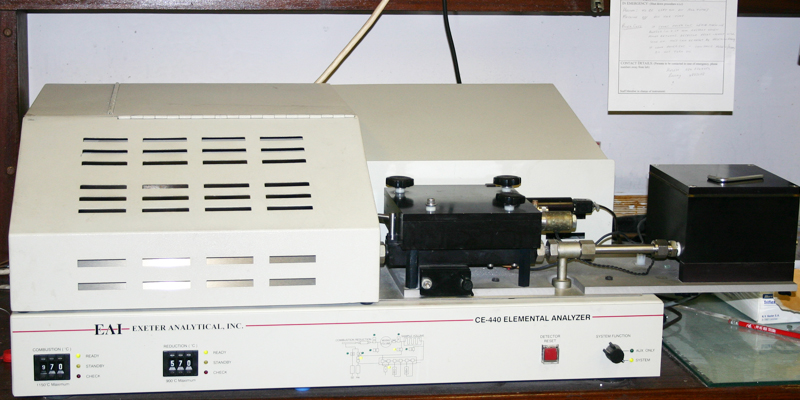
CE440 Elemental Analyser is used for the analysis of carbon, hydrogen and nitrogen. The CE440 is capable of analysing a wide range of samples quickly and relaibly, including organics and pharmaceuticals, environmental samples, polymers, refractories, and volatile and sensitive air samples. Such applications are valuable in the plastics, petrochemicals, agriculture, food and pyrotechnical industries.
Other analytical seervices in the School include;
- Flame Atomic Absorption Analysis
- ICP Analysis
- Micro Balance
- pH Analysis
- Karl Fischer Analysis
Complete the Microanalysis Request Form. The minimal sample required is 3 mg per analysis.
Microanalytical Staff: John Meehan and Noel Browne
Mass Spectrometry
The ABCRF High Resolution Mass Spectrometry Laboratory provides high resolution mass spectrometry services to the Analytical and Biological Research Facility (ABCRF), the School of Chemistry, associated internal/external users and a highly efficient service to industry.
The mass spectrometry group specializes in the characterization of compounds within the mass ranges of 50-60000 Da. Equipment available includes the following mass spectrometers: a Quattro Micro triple quadrupole instrument (2005); an LCT Premier Time Of Flight instrument (2005) and a newly acquired Vion IMS High Resolution mass spectrometer via SFI Infrastructure Award (2019).
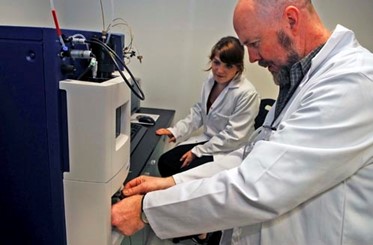
Waters Quattro Micro Triple Quadrupole MS
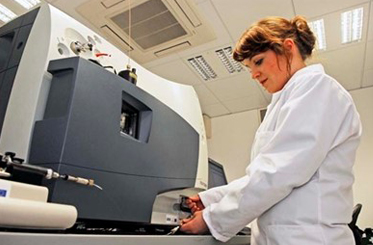
Waters LCT Premier Time of Flight Mass Spectrometer
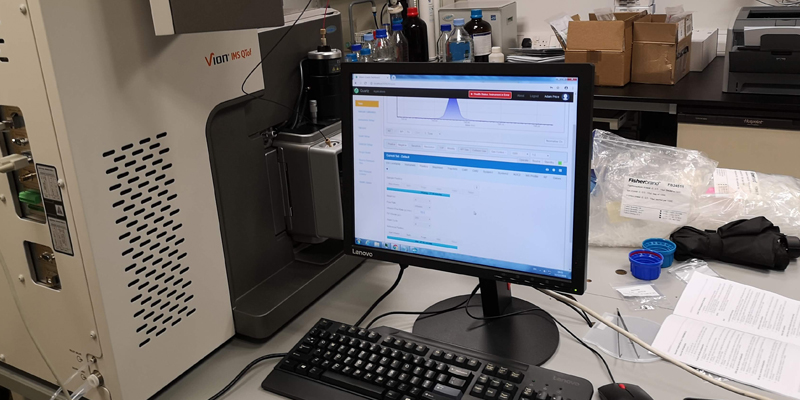
Vion IMS High Resolution Mass Spectrometer
Instruments have been recently refurbished and are maintained annually. The instruments are located in a dedicated, air-conditioned laboratory in the Cavanagh School of Pharmacy Building, UCC. The service is designed to run high throughput Liquid Chromatography Mass Spectrometry (LCMS) utilizing both UPLC and HPLC. Each instrument supports a broad spectrum of teaching and research activities at undergraduate and postgraduate level including undergraduate laboratory support, MSc level projects and synthetic and analytical postgraduate research which relies heavily on this technique. We have a well-established record of delivery for the chemical and pharmaceutical industry in the Munster region and educational institutions throughout the country.
Applications
UCC has excellent LCMS capability and a record for supporting chemistry teaching and research in the following areas:
- Nominal and high resolution mass acquisition to support structural assignments
- Determination of molecular structure and fragmentation
- Investigation of reaction mechanisms, products and side products
- Impurity profiling of food or pharmaceutical process
- Compositional analysis of organic mixtures
- Pharmaceutical chemistry support from discovery to plant
Projects
Collaborative LCMS projects with biological, chemical and food sciences and the Irish pharmaceutical industry include the areas of process research and development, confirmation of structure and composition of mixtures. Sample projects which we have completed include:
- Impurity profiling of pharmaceutical processes for multinational companies with target identification and resolution
- Clinical analysis of biomarkers and drugs in the tumour microenvironment
- Discovery research on the in vitro adduct forms of anticancer compounds
- Open access platform for low resolution sample submission (ca. 50 authorised walk-up users)
- Analysis of synthetic products for undergraduate laboratories of modules CM3102 and PF2013
Further Information
Access plan and charges for external users is solely intended a guide as each project requires an individual approach. In the first instance a project should be discussed and defined by email or phone with Dr. McCarthy before quotation, followed by purchase order and invoicing.
Contact
Spectroscopic Services
A wide range of spectroscopic instruments are available in the School of Chemistry. Where these instruments form part of the equipment of individual research groups, access to them from within the school can generally be gained by discussing required measurements with the principal investigator or with the group members. In addition, the school has a number of shared research instruments, including:
- Fourier Transform Infrared (FTIR) and UATR
- Ultraviolet/visible Spectroscopy
- Fluorescence Phosphorescence Spectrophotometry
Our Spectroscopic Instruments
The ABCRF has developed a major initiative in NMR spectroscopy. The facility comprises of four specialised Bruker NMR instruments for solution phase NMR spectroscopy at 300 MHz, 400 MHz, 500 MHz & 600 MHz, which are located in dedicated, air-conditioned laboratories in the Kane Building and Cavanagh School of Pharmacy Building, UCC. Each instrument supports a broad spectrum of teaching and research activities at undergraduate and postgraduate level.
Background
NMR spectroscopy is based on the interaction of matter (chemical compounds) with electromagnetic energy (radio frequency range) in the presence of a magnetic field. It is widely employed by chemists for the determination of molecular structure, the study of molecular properties, and chemical reaction dynamics. A related technique, magnetic resonance imaging (MRI) is used in clinical medicine.
Applications
UCC now has excellent NMR capability for supporting chemistry teaching and research in the following areas:
- Determination of molecular structure and stereochemistry
- Investigation of reaction mechanisms
- Quantitative NMR (qNMR)
- Conformational analysis of organic molecules
- Heterocyclic chemistry
- Enantioselective synthesis of bio-active compounds
- Pharmaceutical chemistry
- Palladium complexes related to anti-cancer compounds
- Catalysis and materials
Collaborative, NMR linked projects with the biological and food sciences and the Irish pharmaceutical industry are enabled, in the areas of process research and development, protein structure and metabolomics. We have broad experience in the area of quantitative NMR (qNMR) including the following methods and applications:
- Using a known amount of added standard for evaluation of the concentration of a component.
- Using a known amount of added standard for evaluation of the potency of a mixture in terms of the principal or designated component.
- Calibration graph method for evaluation of the concentration of a component (a variant based on the method of incremental additions is also known).
- Using the electronic spike (digital ERETIC) method as an internal standard for quantitative measurement.
- Determination of the enantiomeric composition of a chiral substance (%ee).
- Determination of the ratio of components in a mixture, inc. equilibrium position and equilibrium constant.
- Determination of the % proof of an alcohol containing liquid.
- Determination of the composition of isotopically labelled compounds and position of isotopic label.
- Reaction kinetics.
- Reaction monitoring.
- NMR can be used to determine the molecular mass of a compound.
- Determination of magnetic moments.
Instrumentation
BRUKER AVANCE III 600 MHz UltraShieldTM NMR spectrometer with CryoProbeTM technology
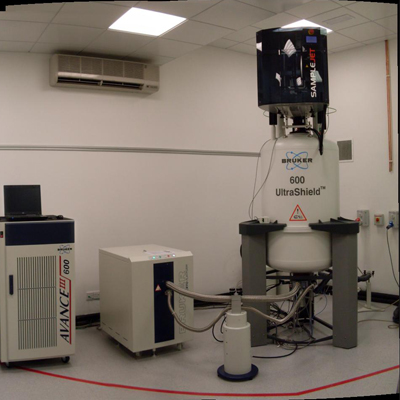
- CryoProbeTM technology for increased sensitivity
- Selection of room temperature and cryoprobes available
- SAMPLEJETTM sample changer - 47 position carousel & capacity for 480 additional tubes via five 96-well plate arrangement
- Variable temperature capability
- Advanced user access via ICONNMR & TopSpin (3.2) software
- Commissioned in Nov. 2008 & co-funded by the HEA and NDP (through PRTLI 4), and SFI.
BRUKER AVANCE III 500 MHz NMR spectrometer
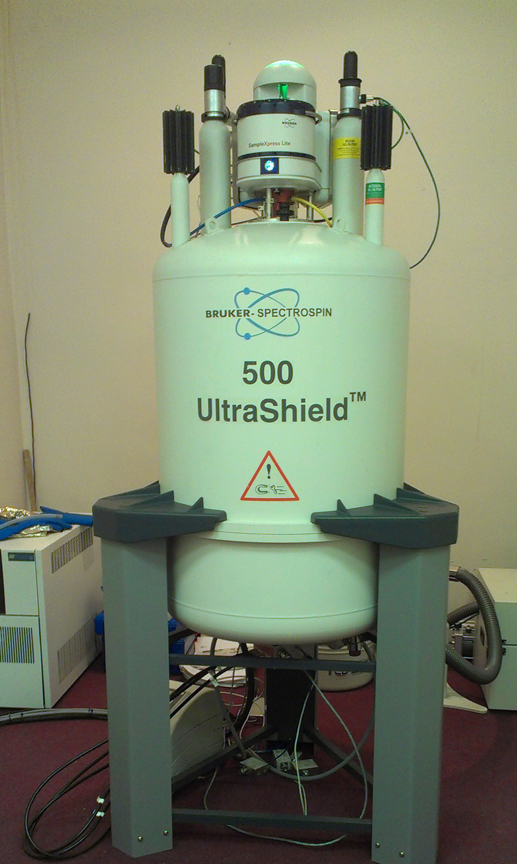
- Advanced user access via ICONNMR & TopSpin (3.2) software
- SampleXpress LiteTM 16 position sample changer
- Probe options: 5 mm dual C/H probe & 5 mm QNP (1H, 13C, 31P, 19F) probe, with ATMA
- Variable temperature capability (including NMR experiments at -90o C on dual C/H probe)
- Operated under regulated conditions
- Console upgraded in 2009, co-funded by the HEA and NDP (through PRTLI 4), and SFI
BRUKER AVANCE 400 NMR spectrometer
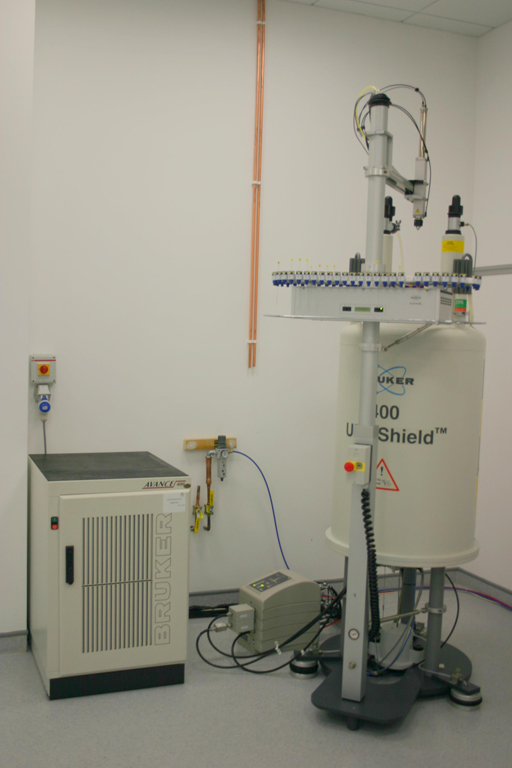
- Available on open access via ICONNMR for authorized users
- BACS-60 sample changer
- Probe options: 5 mm BBFO probe with ATMA & 5 mm QNP probe
- TOPSPIN (2.1) operating software
- The 400 MHz spectrometer was kindly donated by Pfizer Process Development Centre to the ABCRF in 2008. A joint collaboration has been established between the two parties and has enhanced UCC's reputation as a world-class research institution and educator in state-of the-art research and technology for Ireland's rapidly developing pharmaceutical industry.
BRUKER AVANCE III 300 MHz NMR spectrometer
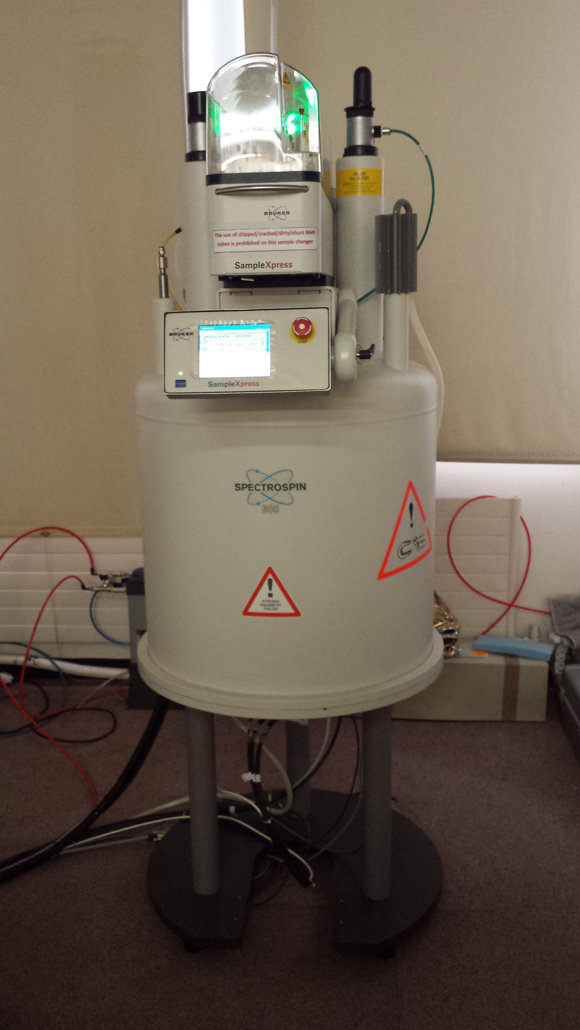
- Available on open access via ICONNMR for authorized users
- TOPSPIN (3.2) software operating system.
- SampleXpressTM 60 position sample changer
- Probe options: 5 mm BBFO probe for observation of nuclei from 15N to 31P & 19F with 1H decoupling or observe & 5 mm broadband multinuclear probe with ATMA or a dedicated 11B NMR probe with proton decoupling channel
- Variable temperature facility
- System upgraded 2013
External Service
- Extensive range of multinuclear & multidimensional solution state NMR experiments available.
- Interpretation service.
- Confidential service & data security.
- Quick turnaround.
- Tailored NMR experimental design to meet client requirements.
- Analysis to a cGMP standard to meet specialist client QC requirement.
- 21CFR11 compliant software.
- Complementary analytical techniques, such as MS & elemental analysis available.
Further Information
X-Ray Crystallography
The school has a Nonius MACH3 diffractometer for single crystal diffraction. It is a point detector system fitted with an Oxford Cryosystems CryoStream for accessing temperatures in the range 90-290 ºC. For further details please contact Dr Simon Lawrence.
